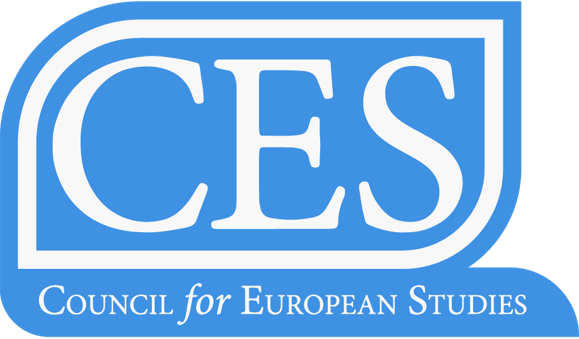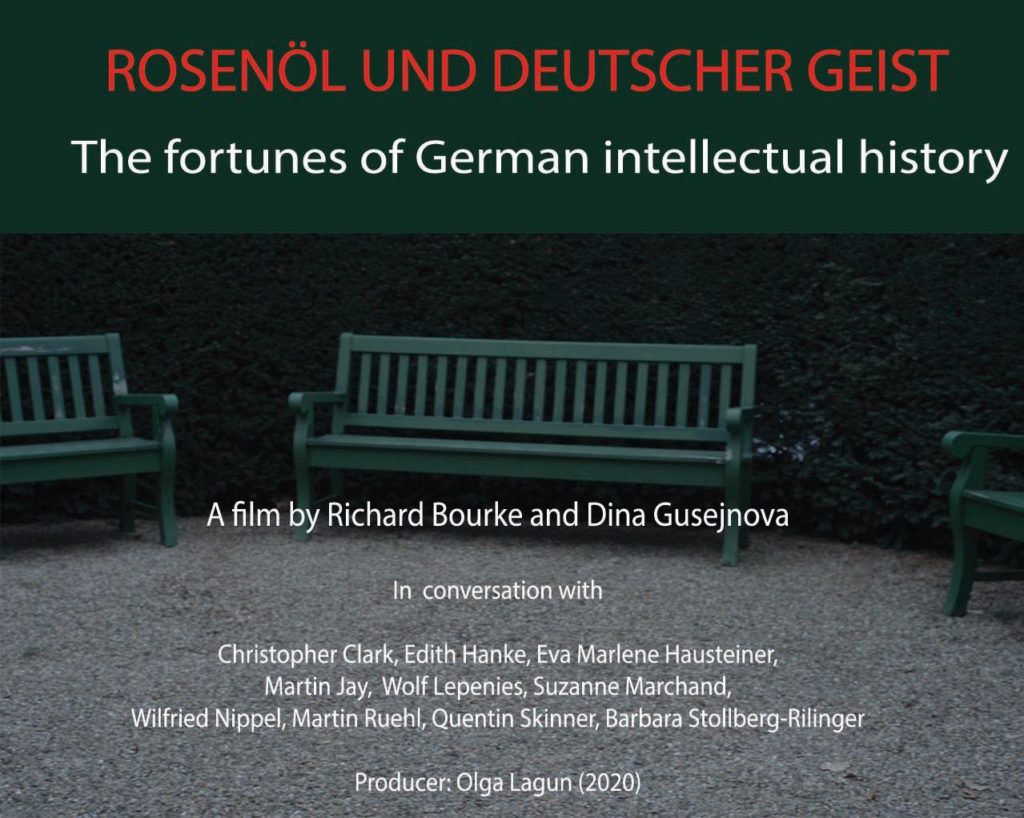The Council for European Studies is thrilled to announce that registration is now open for the third installment of the CES Insights webinar series. These virtual gatherings bring together experts on a variety of topics of pressing concern in contemporary Europe, featuring experts from our Research Networks.
We’re pleased to invite you to the upcoming webinar:
A Film Screening and Discussion: Rosenöl und Deutscher Geist: The Fortunes of German Intellectual History, dir. Richard Bourke and Dina Gusejnova
Thursday, October 29
11:00am PST / 2:00pm EST / 6:00pm GST
Chair: Nicholas Ostrum, Moderator: Samuel Moyn, Discussants: Emily Levine, Robert Pippin
This webinar will discuss the film Rosenöl und Deutscher Geist: the fortunes of German intellectual history” by Richard Bourke (Cambridge) and Dina Gusejnova (LSE), who will offer a brief response prior to the Q&A. This film, produced in 2018-20 in Berlin and London with support from the ZEIT Foundation Hamburg, presents the fortunes of a distinctly German phenomenon. In conversation with colleagues spanning three generations, Richard Bourke and Dina Gusejnova explore how the history of ideas declined in Germany after a period of innovation and prosperity that lasted through the long nineteenth century. Today intellectual history prevails in other parts of the globe. How did this come to pass?
In addressing this question, the film returns to numerous striking episodes, and collects an array of unexpected insights – including Christopher Clark on the absence of a specifically Prussian culture; Quentin Skinner and Wolf Lepenies on the lives of Albert Hirschman; and Barbara Stollberg-Rilinger on the controversies of the 1980s. The film reflects on the shadow cast by Hegel and Burckhardt; the melancholy fate of Prussia; the theological roots of historicism; the Nazi appropriation of cultural history; the impact of exile and emigration; the reestablishment of democracy; and the historical profession since the 1960s.
All attendees are encouraged to watch the film before the webinar. The film is fully subtitled in German and English. A link to the film will be included in the webinar registration confirmation.
This webinar is organized by the CES Critical European Studies Research Network. The Critical European Studies Research Network provides a collaborative, interdisciplinary, and socially engaged space for pedagogical exchange and criticism for researchers and instructors who work on curriculum development, interrogate the evolution of education-focused institutional landscapes, assess the ways in which new media transforms European Studies in the 21st Century, and explore the trajectory of the discipline.
Chair
Nicholas Ostrum teaches at the Department of History and Philosophy at the University of New Orleans, the Department of History at Xavier University of Louisiana, and the Department of Arts and Sciences at Clark State Community College. Nicholas has served on the Research Editorial Committee of the online journal EuropeNow since 2016 and is a member of the CES Critical European Studies Research Network.
Moderator
Samuel Moyn is Henry R. Luce Professor of Jurisprudence at Yale Law school and Professor of History at Yale University. He has written several books in his fields of European intellectual history and human rights history, including The Last Utopia: Human Rights in History (2010), and edited and coedited a number of others. His most recent books are Christian Human Rights (2015), based on Mellon Distinguished Lectures at the University of Pennsylvania in fall 2014, and Not Enough: Human Rights in an Unequal World (2018). A fellow of the new Quincy Institute for Responsible Statecraft, he is currently working on a book on the origins of humane war for Farrar, Straus, and Giroux. Over the years he has written in venues such as the Atlantic, Boston Review, The Chronicle of Higher Education, Commonweal, Dissent, the Guardian, the London Review of Books, The Nation, The New Republic, the New York Times, the Wall Street Journal, and the Washington Post.
Speakers

Emily Levine is an Associate Professor of Education at Stanford University. Before, she was an Associate Professor of Modern European History. Dr. Levine received her PhD in History and the Humanities at Stanford and her BA from Yale, where she later returned as an Andrew W. Mellon Postdoctoral Fellow. She is the author of Dreamland of Humanists: Warburg, Cassirer, Panofsky, and the Hamburg School (University of Chicago Press, 2013), which was awarded the Herbert Baxter Adams Prize by the American Historical Association for the best book in European history from 1815 through the 20th Century. Levine has published in The New York Times, the LA Review of Books, Foreign Policy, The Chronicle of Higher Education, and Inside Higher Ed, as well as in top scholarly journals. She recently completed A New Currency for the World: The History of the Modern Research University, which was supported by fellowships from the National Humanities Center and the Alexander von Humboldt Foundation, and is forthcoming from the University of Chicago Press in fall 2020.

Robert Pippin is the Evelyn Stefansson Nef Distinguished Service Professor in the Committee on Social Thought, the Department of Philosophy, and the College at the University of Chicago. He is the author of several books and articles on German idealism and later German philosophy, including Kant’s Theory of Form; Hegel’s Idealism: The Satisfactions of Self-Consciousness; Modernism as a Philosophical Problem; and Idealism as Modernism: Hegelian Variations. In addition, he has published on issues in political philosophy, theories of self-consciousness, the nature of conceptual change, and the problem of freedom. He also wrote a book about literature and philosophy: Henry James and Modern Moral Life. A collection of his essays in German, Die Verwirklichung der Freiheit, appeared in 2005, as did The Persistence of Subjectivity: On the Kantian Aftermath, and his book on Nietzsche, Nietzsche, moraliste français: La conception nietzschéenne d’une psychologie philosophique, appeared in 2006. Fatalism in American Film Noir: Some Cinematic Philosophy appeared in 2012. He was twice an Alexander von Humboldt fellow, is a winner of the Mellon Distinguished Achievement Award in the Humanities, and was recently a fellow at the Wissenschaftskolleg zu Berlin. He is a fellow of the American Academy of Arts and Sciences and is a member of the American Philosophical Society. He is also a member of the German National Academy of Arts and Sciences.

Richard Bourke is a Professor of the History of Political Thought and a Fellow of King’s College at the University of Cambridge. He completed his PhD at the University of Cambridge. His first academic post was in Dublin before moving to Queen May University of London, where he became Professor in the School of History in 2012. He was elected as the chair in the History of Political thought at Cambridge in 2018. Dr. Bourke, has a number of Fellowships in Europe and the United States (Wissenschaftskolleg zu Berlin, Humboldt Stiftung, DAAD, Freie Universität, LMU Munich, Huntington, Beinecke, William Andrews Clark Memorial Library, John Carter Brown Library). He has published widely in intellectual history and the history of political ideas, above all on enlightenment political theory. His most recent monograph, Empire and Revolution: The Political Life of Edmund Burke, appeared with Princeton University Press in 2015. He is currently working on the philosophy of history since Rousseau and Kant, and on the history of democratic thought in the ancient and modern worlds.

Dina Gusejnova is an Assistant Professor at the Department of International History at LSE. Prior to this, she was a Senior lecturer at the University of Sheffield and a Collegiate Assistant Professor at the University of Chicago, and has held teaching and research appointments at Queen Mary University of London and UCL. Dina is the author of European Elites and Ideas of Empire, 1917-57 (2016), which examines the intellectual life of Europe’s fading empires through the presence of German-speaking intellectuals, and the editor of Cosmopolitanism in Conflict. Imperial Encounters from the Seven Years’ War to the Cold War(2018). Dina’s current research concentrates on the circulation of ideas of citizenship and nationality in the context of the internment of continental Europeans in Britain during the Second World War.
This webinar will take the form of a moderated discussion, where panelists respond to questions from the moderator, each other, and the audience. Please join us for a lively conversation!
If you have any questions, please contact events@ces-europe.org.



